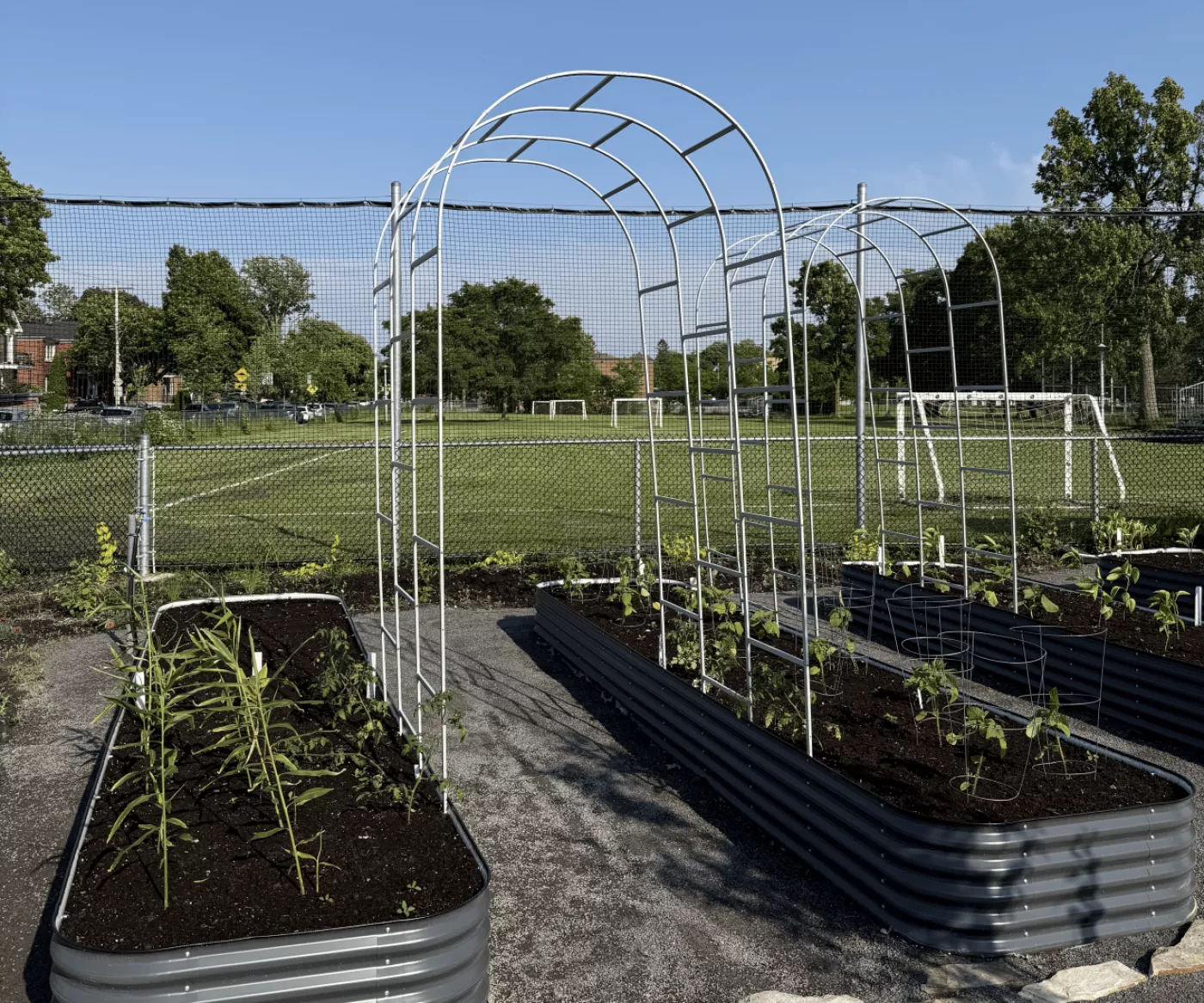The Côte-des-Neiges-Notre-Dame-de-Grâce borough is inaugurating the first vertical solidarity garden in Montreal: the Fielding vertical garden.
Located in Loyola Park in the Notre-Dame-de-Grâce district and covering an area of 770 square metres, it is one of the urban agriculture development initiatives selected and funded by the city of Montreal (Programme de soutien aux arrondissements pour l'aménagement et la réfection des jardins communautaires et collectifs publics 2024 (PDI-JCCM)). The total investment by the Bureau de la transition écologique (BTER) for the development of the Fielding garden is $190,000.
The first vertical garden of its kind, it is surrounded by beds of edible trees, shrubs and perennials, most of which are native to the area and friendly to pollinators. 500 plants were planted in the structures in the spring, in addition to almost 330 in the flowerbeds.
Citizen science and citizen-gardeners
The participatory science aspect of this vertical urban agriculture project aims to measure the yields of different vertical technologies in the ground and above ground (low-tech), while at the same time supporting citizens who wish to increase their skills and take part in a solidarity-based approach.
The project involves 20 citizen-gardeners in planting, maintaining and cultivating the plants, collecting data on plant growth and the effectiveness of vertical production technologies. It is supervised by AU/LAB, an NPO that supports various urban agriculture initiatives. As well as overseeing the project, AU/LAB has been tasked with developing guides and practice books that will serve gardeners for years to come.
A community project
As well as serving as an urban agriculture laboratory, the Fielding Vertical project will enable more residents to garden, and will also contribute to food security in the neighbourhood. Harvests will be shared equally between gardeners and local food security organisations.
"The Fielding vertical community garden is a first for Montreal and illustrates our administration's commitment to providing accessible, sustainable and innovative urban agricultural spaces. This project will strengthen the food self-sufficiency of our communities while enriching biodiversity in the urban environment. This collective garden is not just a place for growing crops, but also a place for people to meet and share, where nature and the community come together to green our city together," said Gracia Kasoki Katahwa, Mayor of the Côte-des-Neiges-Notre-Dame-de-Grâce borough.
Despina Sourias, city councillor for the Loyola district, adds that "this garden is first and foremost a victory for our local community. Thanks to the involvement of our residents and neighbourhood organisations, the Fielding Garden is becoming a living place of learning, sharing and solidarity. It reflects what makes Loyola strong: committed people, strong neighbourhood ties and a shared desire to take care of our world, one vegetable garden at a time."
The many advantages of verticality
Thanks to its verticality, the space available for growing will be optimised. As well as saving space, it also means better water management. These vertical growing spaces can accommodate a wide variety of nutritious plants, climbing or otherwise, vegetables, herbs or small fruit.
An accessible garden
The raised planters are ideal for people with reduced mobility, who can take advantage of the above-ground planters with hoops to grow a variety of climbing cultivars such as cucumbers and melons.
The borough's territory and food security
The borough is home to a variety of cultural communities and is notable for the social inequalities that exist throughout its territory. Of the 170,583 people living in private households in the area in 2021, 38,630 were on low incomes, representing 24% of the population.
In 2022, the post-pandemic economic context and the inflation that followed left many households impoverished and forced to turn to food banks. Faced with an increase in demand of up to 60%, food security agencies are going through a difficult period. One of the solutions identified to reduce this gap is to develop greater food autonomy through urban agriculture.
AU/LAB's expertise
AU/LAB is a not-for-profit organisation that encourages the emergence of initiatives relating to the production, processing, distribution and marketing of urban agriculture with a view to developing a sustainable food system and a circular economy. Since its creation in 2009, its multidisciplinary team has been documenting, supporting and promoting innovation in urban agriculture by assisting municipalities, organisations and businesses, as well as creating knowledge transfer programmes.
SOURCE City of Montreal - Borough of Côte-des-Neiges - Notre-Dame-de-Grâce



